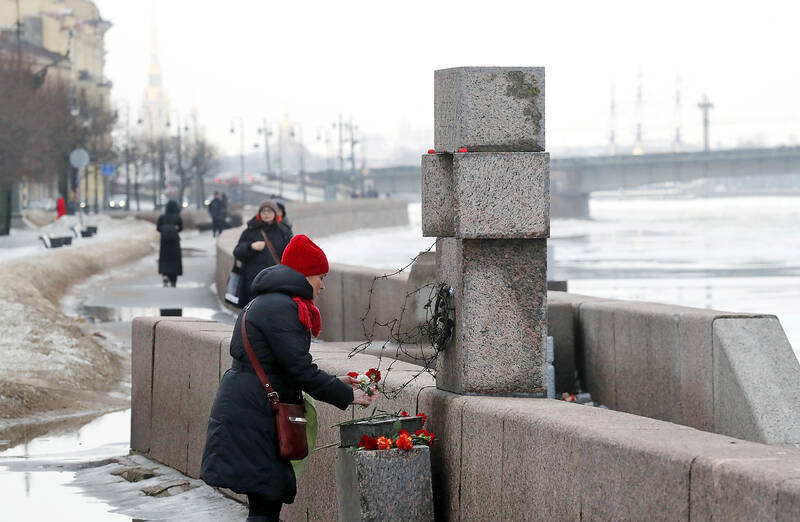The body of Russian opposition leader Alexei Navalny has been handed to his mother more than a week after he died in an arctic prison colony, his team said on Saturday.
Navalny, Russian President Vladimir Putin’s most prominent critic, died on Feb. 16 in one of Russia’s toughest prisons in northern Siberia.
He was serving a 19-year sentence on charges denounced by Putin’s critics as political retribution for his opposition activity.

Photo: EPA-EFE
“Alexei’s body was handed over to his mother,” a spokesperson for Navalny’s team, Kira Yarmysh, wrote on X. “Many thanks to all those who demanded this with us.”
For a week, Russian officials had refused to give Lyudmila Navalnaya custody of her son’s body.
She had traveled to the town of Salekhard in the Yamalo-Nenets region, the nearest settlement to the prison colony where Navalny died, to recover it.
On Friday, Navalny’s team said they had filed a lawsuit to obtain the body. They accused local officials of having threatened to bury him on the prison grounds if his mother did not agree to a “secret” funeral.
On Saturday, plans for the funeral were still unclear, Yarmysh wrote on X.
“Lyudmila Ivanovna is still in Salekhard. The funeral is still pending,” she wrote. “We do not know if the authorities will interfere to carry it out as the family wants and as Alexei deserves.”
His team has already argued that the Kremlin is trying to block a public funeral, which could turn into a show of support for Navalny’s movement and his opposition to Putin.
The Russian leader, who famously never said Navalny’s name in public, has not commented on the death of his most vocal critic.
Kremlin spokesman Dmitry Peskov has criticized statements by Navalny’s wife and Western leaders blaming Putin for his death as “vulgar.”
Russian authorities said Navalny died of “natural causes” after he lost consciousness following a walk in the prison colony, nicknamed “Polar Wolf.”
His team denounced officials’ initial refusal to release his body — their refusal for days to let his mother even see it — accusing them of trying to “cover their tracks.”
G7 leaders, in a statement on Saturday praising Navalny’s “life fighting against the Kremlin’s corruption” also called for the truth.
“We call on the Russian government to fully clarify the circumstances around his death,” said the statement from the G7 nations: Canada, France, Germany, Italy, Japan, the UK and the US.
Tens of thousands of Russians had signed a petition calling for Navalny’s body to be released. Dozens of high-profile Russian cultural figures published video messages urging the same.
Earlier on Saturday, Yulia Navalnaya continued her attack on Putin for what she said was his role in her husband’s death and the initial refusal to release his body.
“You tortured him alive, now you torture him while he is dead,” Yulia Navalnaya said in a video posted online.
“What Putin is doing now is hatred. No, not even hatred, it’s some kind of Satanism,” she said.
She has vowed to continue her husband’s work.
Navalny’s death came after three years of being held in Russian prisons.

POLITICAL PRISONERS VS DEPORTEES: Venezuela’s prosecutor’s office slammed the call by El Salvador’s leader, accusing him of crimes against humanity Salvadoran President Nayib Bukele on Sunday proposed carrying out a prisoner swap with Venezuela, suggesting he would exchange Venezuelan deportees from the US his government has kept imprisoned for what he called “political prisoners” in Venezuela. In a post on X, directed at Venezuelan President Nicolas Maduro, Bukele listed off a number of family members of high-level opposition figures in Venezuela, journalists and activists detained during the South American government’s electoral crackdown last year. “The only reason they are imprisoned is for having opposed you and your electoral fraud,” he wrote to Maduro. “However, I want to propose a humanitarian agreement that

ECONOMIC WORRIES: The ruling PAP faces voters amid concerns that the city-state faces the possibility of a recession and job losses amid Washington’s tariffs Singapore yesterday finalized contestants for its general election on Saturday next week, with the ruling People’s Action Party (PAP) fielding 32 new candidates in the biggest refresh of the party that has ruled the city-state since independence in 1965. The move follows a pledge by Singaporean Prime Minister Lawrence Wong (黃循財), who took office last year and assumed the PAP leadership, to “bring in new blood, new ideas and new energy” to steer the country of 6 million people. His latest shake-up beats that of predecessors Lee Hsien Loong (李顯龍) and Goh Chok Tong (吳作棟), who replaced 24 and 11 politicians respectively

Young women standing idly around a park in Tokyo’s west suggest that a giant statue of Godzilla is not the only attraction for a record number of foreign tourists. Their faces lit by the cold glow of their phones, the women lining Okubo Park are evidence that sex tourism has developed as a dark flipside to the bustling Kabukicho nightlife district. Increasing numbers of foreign men are flocking to the area after seeing videos on social media. One of the women said that the area near Kabukicho, where Godzilla rumbles and belches smoke atop a cinema, has become a “real

‘WATER WARFARE’: A Pakistani official called India’s suspension of a 65-year-old treaty on the sharing of waters from the Indus River ‘a cowardly, illegal move’ Pakistan yesterday canceled visas for Indian nationals, closed its airspace for all Indian-owned or operated airlines, and suspended all trade with India, including to and from any third country. The retaliatory measures follow India’s decision to suspend visas for Pakistani nationals in the aftermath of a deadly attack by shooters in Kashmir that killed 26 people, mostly tourists. The rare attack on civilians shocked and outraged India and prompted calls for action against their country’s archenemy, Pakistan. New Delhi did not publicly produce evidence connecting the attack to its neighbor, but said it had “cross-border” links to Pakistan. Pakistan denied any connection to